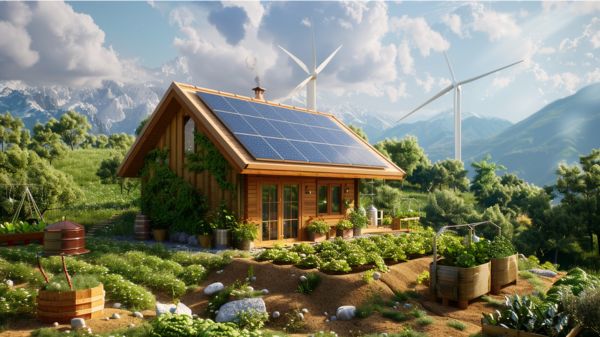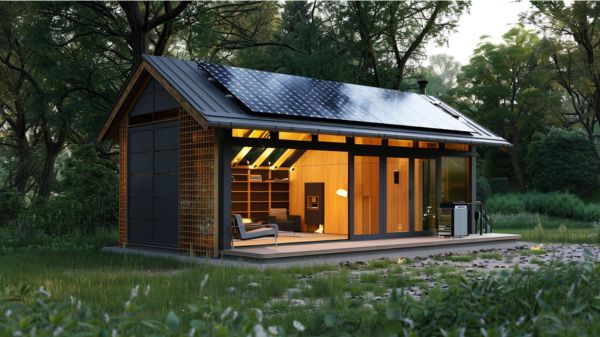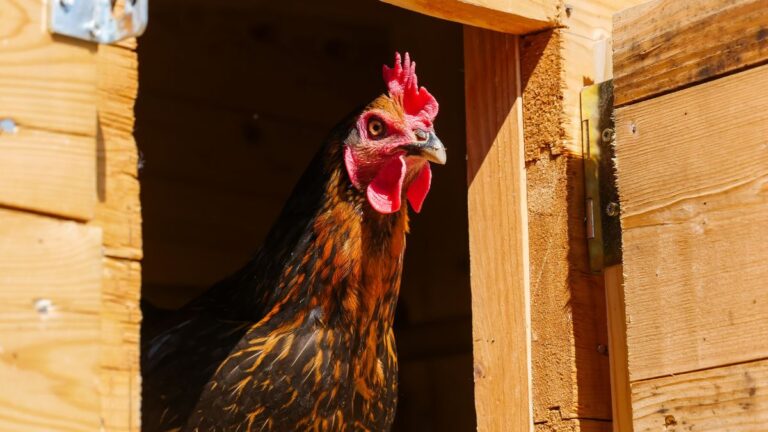7 Best Off-Grid Water and Energy Solutions
Looking to disconnect from traditional energy sources? This 7 best off-grid water and energy solutions bring innovation to your fingertips. From harnessing the sun’s power to tapping into the wind’s energy, these sustainable options provide reliable electricity off the grid.
But what about water solutions? Stay tuned to explore how micro-hydropower systems and other cutting-edge technologies are reshaping the way we power our lives independently.
Key Takeaways
- Solar, wind, micro-hydropower, and biomass offer efficient off-grid energy solutions.
- Energy storage with lead-acid or lithium-ion batteries is crucial for off-grid setups.
- Combining wind and solar power can create cost-effective off-grid electricity solutions.
- Maximizing water availability and location selection are vital for micro-hydropower system efficiency.
Solar Energy Solutions
Solar energy solutions offer an efficient and sustainable way to harness the power of the sun for off-grid water and energy needs. With solar panels reaching up to 46% efficiency, an average 22% efficiency can still generate 1,250 watt-hours per day in sunny locations like California.
For a home’s electricity requirements, approximately 24 solar panels might be necessary. The cost of solar energy systems varies from $10,000 to $30,000 based on size and components. These systems convert sunlight into energy, which is then transformed into usable AC power through inverters for home use.
Embracing solar power not only liberates you from traditional grids but also aligns with sustainable and innovative solutions for your energy independence.
Related Post: The Best 10 DIY Solar Panel Kits for Off-Grid Power.
Wind Power Solutions
Harnessing the power of air motion, wind power solutions provide a sustainable and efficient method to generate electricity off-grid. When considering off-grid power solutions for residential energy needs, wind turbines offer a reliable option with various benefits:
- Wind Turbines: Available in sizes from 5 kW to 15 kW, suitable for residential use.
- Turbine Efficiency: Initial investment costs range from $3000 to $5000 per kilowatt, justified by long-term energy generation.
- Wind Speed: Optimal energy production depends on the wind speed at the location.
- Hybrid Systems: Combining wind and solar energy can create cost-effective off-grid power solutions tailored to your energy needs.
Related Post: The Best Home Wind Turbines for 2023.
Micro Hydropower Solutions
For off-grid enthusiasts seeking reliable and sustainable energy solutions, micro hydropower systems present a promising option with power capacities ranging from 5 to 100 kilowatts.
Energy production from these systems can easily reach 10 kWh for a home, depending on factors such as head (vertical drop) and flow rate of water available. These systems offer continuous energy production, making them highly reliable for off-grid locations.
However, it’s essential to consider the installation location and water availability before setting up a micro hydropower system. Ensuring a steady flow of water is crucial for maximizing the efficiency of these systems, providing you with a continuous and environmentally friendly source of power.
| Key Factors | Description |
|---|---|
| Power Capacity | Ranges from 5 to 100 kilowatts |
| Energy Production | Can reach up to 10 kWh depending on setup |
| Reliability | Offers continuous energy production for off-grid living |
| Location | Choosing the right location is crucial for optimal output |
| Water Availability | Ensuring a steady flow of water is essential for efficiency |
Biomass Energy Solutions
Maximizing your off-grid energy potential extends beyond micro hydropower systems; exploring biomass energy solutions harnesses the power of organic materials for sustainable electricity generation.
Biomass energy solutions utilize organic matter like wood, crop residues, and animal waste for power generation. Gasification of biomass converts solid materials into a versatile gas for electricity production. This method is considered carbon-neutral since the carbon emitted is part of the natural carbon cycle.
Biomass power plants offer consistent and reliable electricity, especially beneficial in rural areas abundant in biomass resources. By embracing biomass energy solutions, you can opt for a renewable and sustainable alternative to fossil fuels, contributing to a greener future.
Energy Storage Solutions
Efficient energy storage solutions are essential for maximizing the potential of off-grid systems, ensuring reliable power availability even during low generation periods. Lead-acid batteries, cost-efficient options, are commonly used for storing energy in off-grid setups.
While more expensive, Lithium-ion batteries offer higher energy efficiency. The Yeti 6000X by Goal Zero, a portable power station, provides 6000 watt-hours of lithium energy for off-grid use.
Energy storage plays a crucial role in solar, wind, and hydropower systems by capturing excess energy for later use. To enhance storage capacity, connecting multiple batteries in a battery bank is recommended for a more reliable power supply in off-grid settings.
Make the most of your off-grid energy systems by choosing the right type of energy storage solution for your needs.
Related Post: Energy Storage System Vs Backup Generator: Which is Better?
Frequently Asked Questions
What Is the Most Efficient Off-Grid Energy System?
For the most efficient off-grid energy system, consider micro-hydro options. Harness the power of flowing water to generate electricity continuously. Achieve high output for your home, offering reliability and sustainability in your energy independence journey.
What Is the Best Power System for Off-Grid?
When weighing solar versus wind for off-grid power, consider your location and needs. Battery storage ensures energy availability. Micro-hydro offers continuous power. Generator backup boosts reliability. Choose energy-efficient solutions for cost savings. Opt for renewable resources.
What Is the Best Way to Power Off-Grid Houses?
To power off-grid houses effectively, consider solar panels for sunlight conversion, wind turbines in windy areas, micro-hydropower systems near flowing water, and geothermal energy for heating. Embrace solar batteries, rainwater harvesting, water filtration, composting toilets, and greywater recycling for sustainability.
What Is the Best Investment for Off-Grid?
When deciding on off-grid investments, prioritize solar panels for reliable energy, rainwater harvesting for sustainable water, wind turbines for cost-effective power, and micro-hydro systems for high electricity generation. Optimize your setup for freedom and sustainability.
Conclusion
You’ve learned about the top 7 off-grid water and energy solutions, all designed to provide sustainable and independent sources of power. From solar and wind energy to micro-hydropower and biomass solutions, there are innovative options available for those seeking to live off the grid.
With advancements in energy storage technology, you can store excess energy for later use, ensuring a reliable power supply. Embrace these eco-friendly solutions for a greener and more sustainable future.






